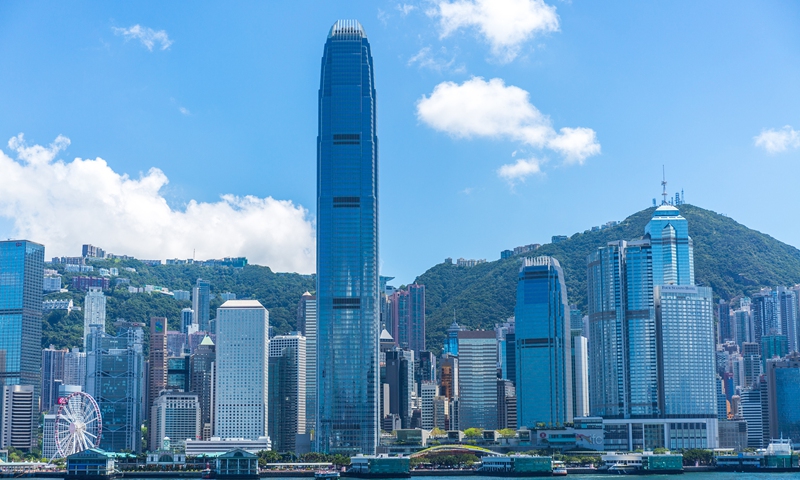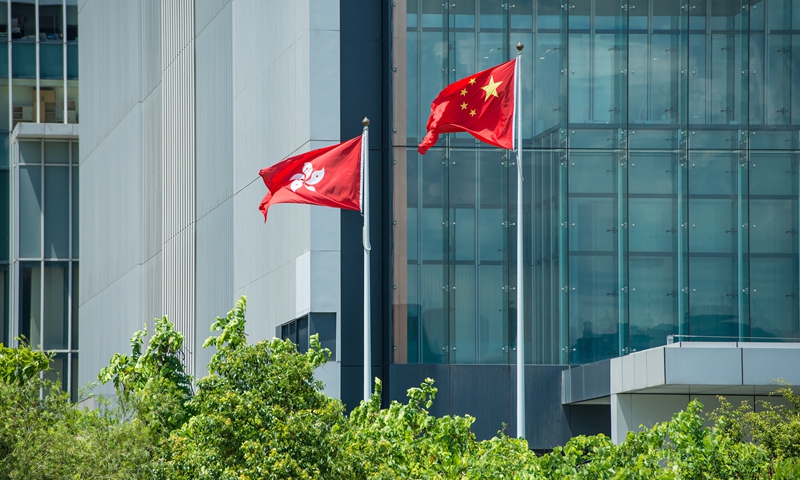
Hong Kong File Photo: VCG
No US sanctions or “cancellation of Hong Kong’s special status” will sway China’s determination to fix national security loopholes in Hong Kong as the central government must have had taken into consideration possible US responses and is preparing for countermeasures, Chinese experts said.
China’s top legislature will deliberate on a draft bill to establish and improve the legal framework and enforcement mechanisms in order to safeguard national security in the Hong Kong Special Administrative Region (HKSAR).
Reacting to the decision, US Secretary of State Mike Pompeo and the White House economic adviser, Kevin Hassett, signaled the Trump administration would punish China, including ending the special status of Hong Kong, which would subject goods from Hong Kong to the same US tariffs now applied to ones from Chinese mainland, the New York Times reported.
Tang Fei, a member of the Council of the Chinese Association of Hong Kong and Macao Studies, told the Global Times on Saturday that opposition forces in Hong Kong may make a strong push to lobby the US to issue sanctions or even abolish the US-Hong Kong Policy Act of 1992 and revoke Hong Kong's "special status" under US law.
But Tang warns that this move would also have a detrimental effect on the US itself with Hong Kong's business circle and the US business circle in Hong Kong likely to voice objection, so the US is still weighing up the option.
Nonetheless, despite the negative consequences, the US is "very likely" to scrap the Act, according to Tang.
If the US makes such a move, Hong Kong’s economic prospects will look dim, said Tang, adding that it may force Hong Kong to change its economic structure, which is not necessarily a bad thing.
Tian Feilong, a Hong Kong affairs expert at Beihang University in Beijing, told the Global Times on Saturday that US reactions may include sanctions against relevant organizations and people in the national security law.
The US may also issue sanction measures in its delayed report on Hong Kong's autonomy, presumably in trade matters.
Tian believes the central government must have taken into consideration US responses when making the decision of legislation, and will take countermeasures when necessary.
"China's countermeasures include restricting US senators and administrative officials who are involved in sanctioning China from entering Hong Kong, Macao and the mainland. As for extreme anti-China politicians, China can start investigations against them and cut their ties with Chinese interest entities," Tian noted.

HK File Photo: VCG
No backing down on national security Yuan Zheng, a research fellow at the Chinese Academy of Social Sciences (CASS), told the Global Times, some separatists in Hong Kong used to think the central government may be hesitant in enforcing stronger measures in Hong Kong considering its special economic stature. This is why the rioters and secessionists are becoming more savage regarding their actions.
“But I think Hong Kong’s stature is no longer that important and special – or to say it has declined – since the mainland’s reform and opening-up and the rise of free trade areas, like in Shanghai,” Yuan said.
He noted that the central government pays more attention to national security while the violence, rioting and foreign interference since last year in Hong Kong makes the move to fix loopholes urgent.
Otherwise, there will be no stability and prosperity in Hong Kong any more, Yuan said.
As for China-US ties, Yuan said that bilateral relations have already been strangled by the US and no one from the US side is doing anything to improve it.
“The US keeps exerting pressure on China, hoping to make it bend, which will never work and may incur strong countermeasures,” Yuan said, noting that China would never make any compromises in regard to national security.
Diao Daming, an associate professor at the Renmin University of China in Beijing, told the Global Times that the US’ previous decision giving Hong Kong special status also aimed at serving US interests, and it could not be used as leverage to pressure China. It would also not change the Chinese central government and the people’s resolution and confidence in safeguarding Hong Kong, and the US should not miscalculate this.
Aside from the US, the EU and some US allies also voiced their concerns over the Hong Kong security laws. The EU released a statement on Friday, saying that “the EU considers that the democratic debate, consultation of key stakeholders, and respect for protected rights and freedoms in Hong Kong would represent the best way to proceed with the adoption of national security legislation, as foreseen in Article 23 of the Basic Law.”
The EU said it will continue to follow the developments closely.
UK Foreign Secretary Dominic Raab, Australian Foreign Minister Marise Payne and Canadian Foreign Minister François-Philippe Champagne made a joint statement on Friday saying that “We are deeply concerned regarding proposals for introducing legislation related to national security in Hong Kong.”
The statement claimed that making the draft law would “undermine the principle of ‘One Country, Two Systems.’”
In response, a spokesperson from the office of the Commissioner of the Ministry of Foreign Affairs in the HKSAR released a statement on Saturday, calling on countries to respect China’s sovereignty and security, and stop interfering in Hong Kong and China’s domestic affairs.
Some nations jumped in angrily to make groundless accusations regarding the deliberation of China’s top legislature on Hong Kong's security laws and even made threats, to which the spokesperson from the Office of the Commissioner of the Ministry of Foreign Affairs in the HKSAR firmly opposes.
Various foreign forces colluded with rioters in Hong Kong to conduct escalating acts of violence, engaged in terrorist activities, interfered in internal affairs and used HK to jeopardize China’s national security, which must be contained, the spokesperson said.
The spokesperson said that certain politicians’ attempts and conspiracy to plot rioters against the Chinese central government, and use Hong Kong as a gateway to separate, overturn, infiltrate, destroy and infringe upon China’s sovereignty will never succeed.
The Chinese Embassy in Canada also said on Saturday that the joint statement of the three foreign ministers made “groundless comments” on China’s top legislature’s deliberation of the draft law, rudely interfering in China’s domestic affairs and related Hong Kong issues, which China firmly opposes.
Any country in the world, no matter if it is a unitary or federal state, it is in the state’s legislative power to make national security laws. China’s NPC and its Standing Committee has the power and responsibility to establish and improve the legal framework and enforcement mechanisms in order to safeguard national security in the HKSAR, according to the release by the embassy.





